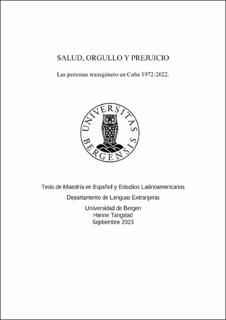| dc.contributor.author | Tangstad, Hanne | |
| dc.date.accessioned | 2023-09-29T23:37:28Z | |
| dc.date.available | 2023-09-29T23:37:28Z | |
| dc.date.issued | 2023-09-02 | |
| dc.date.submitted | 2023-09-29T22:00:04Z | |
| dc.identifier.uri | https://hdl.handle.net/11250/3093251 | |
| dc.description.abstract | Esta tesis de maestría es un estudio de la historia de las personas transgénero cubanas durante los últimos 50 años, enfocándose en el cambio político ocurrido en relación a las minorías sexuales y de identidad de género en la década de 1970. Se produjo una transición sorprendente: de un enfoque estatal altamente opresivo y discriminatorio, a un enfoque constructivo, basado en la salud, donde el conocimiento y el intento de normalizar las cuestiones transgénero han luchado contra las construcciones tradicionales de género, así como contra la homofobia y la transfobia. En particular, nos interesa analizar qué efecto ha tenido este enfoque en la vida y la historia de las personas trans en Cuba. La historia de las personas transgénero cubanas no ha sido recopilada ni registrada anteriormente, tanto porque no tenían la terminología para identificar a las personas transgénero, como porque a las personas transgénero no se les ha dado la oportunidad de contar su historia por sí mismas. Por lo tanto, parte de este estudio ha consistido en recopilar acontecimientos históricos en una cronología. A través de una investigación histórica cualitativa, con un enfoque en entrevistas en profundidad con las historias de vida de personas transgénero que viven en Cuba, esta tesis analiza la transición de una realidad bajo opresión para las personas transgénero, a una realidad fundada en derechos y salud, pero todavía bajo control estatal. El objetivo de esta investigación es analizar la transición de la narrativa transgénero cubana desde los años 70 a la comunidad transgénero actual, en conexión con el proceso de obtención de la igualdad de derechos, a través de una reconstrucción histórica y los testimonios orales que captan las experiencias de las personas transgénero cubanas, y los efectos y consecuencias que los hechos históricos han tenido en su vida actual. La investigación muestra que la lucha por los derechos liderada de manera hegemónica por la institución estatal Centro Nacional de Educación Sexual, CENESEX, ha propiciado una mayor visibilización del fenómeno trans en la sociedad cubana, así como cambios legislativos a favor de las personas trans. Sin embargo, los participantes en este proyecto y otros críticos han expresado el deseo de tener más derechos y más influencia en su propia lucha por los derechos. Además, los hallazgos muestran que existe un alto grado de transfobia y discriminación social e institucional en la sociedad cubana, donde aún dominan tradicionales patrones de roles de género. El estudio da una idea de lo que significa ser transgénero en Cuba y de los desafíos que enfrentan y han enfrentado durante los últimos 50 años. | |
| dc.description.abstract | This master's thesis is a study of the history of Cuban transgender people during the last 50 years, focusing on the political change that occurred in relation to sexual and gender identity minorities in the 1970s. A surprising transition occured: from a highly oppressive and discriminatory state approach, to a constructive approach, based on health, where knowledge and the attempt to normalize transgender issues have fought against traditional gender constructions, as well as against homophobia and transphobia. Through qualitative historical research, with a focus on in-depth interviews with the life stories of transgender people living in Cuba, this thesis analyzes the transition from a reality under oppression for transgender people, to a reality based on rights and health, but still under state control. The objective of this research is to analyze the transition of the Cuban transgender narrative from the 70s to the current transgender community, in connection with the process of obtaining equal rights, through a historical reconstruction and oral testimonies that capture the experiences of Cuban transgender people, and the effects and consequences that historical events have had on their current life. The investigation shows that the fight for rights led in a hegemonic way by the state institution National Center for Sexual Education, CENESEX, has led to a greater visibility of the trans phenomenon in Cuban society, as well as legislative changes in favor of trans people. However, the participants in this project and other critics have expressed a desire for more rights and more influence in their own fight for rights. In addition, the findings show that there is a large degree of social and institutional transphobia and discrimination in Cuban society, where traditional gender role patterns still dominate.The study gives an insight into what it means to be transgender in Cuba and the challenges they face and have faced over the last 50 years. Furthermore, the study offers a critical look at a state-controlled freedom struggle and shows the duality of being grateful for what one has achieved, but not satisfied, because it simply isn't enough. | |
| dc.language.iso | spa | |
| dc.publisher | The University of Bergen | |
| dc.rights | Copyright the Author. All rights reserved | |
| dc.subject | Cuba | |
| dc.subject | transexual | |
| dc.subject | queer | |
| dc.subject | Transgender | |
| dc.subject | history | |
| dc.subject | Castro | |
| dc.subject | Cenesex | |
| dc.title | SALUD, ORGULLO Y PREJUICIO - Las personas transgénero en Cuba 1972-2022. | |
| dc.title.alternative | HEALTH, PRIDE AND PREJUDICE - Transgender people in Cuba 1972-2022. | |
| dc.type | Master thesis | |
| dc.date.updated | 2023-09-29T22:00:04Z | |
| dc.rights.holder | Copyright the Author. All rights reserved | |
| dc.description.degree | Mastergradsoppgave i spansk og latinamerikastudier | |
| dc.description.localcode | SPLA350 | |
| dc.description.localcode | MAHF-SPLA | |
| dc.description.localcode | MAHF-LÆFR | |
| dc.subject.nus | 711128 | |
| fs.subjectcode | SPLA350 | |
| fs.unitcode | 11-20-0 | |
